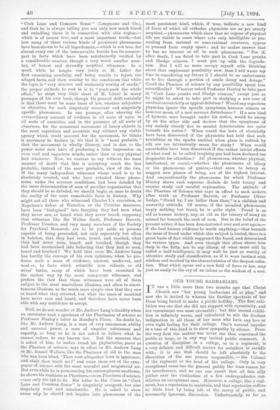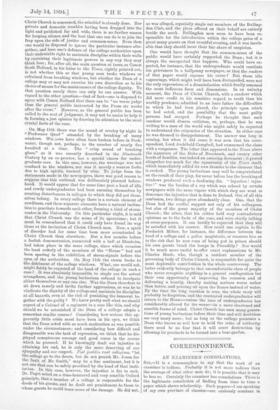OUR YOUNG BARBARIANS.
IT was a little more than two months ago that Christ- • Church saw "her young barbarians all at play," and now she is invited to witness the further spectacle of her Dean being baited to make a public) holiday. The first exhi- bition was one that she did not support with equanimity, and her resentment was most excusable ; but this second exhibi- tion is infinitely worse, and calculated to stir the liveliest indignation in all those of her sons who have any love or even right feeling for their college. One's natural impulse in a case of this kind is to show sympathy by silence. From the very first the matter was never one that concerned the- public at large, or in any way invited public comment. I question of discipline in a college, as in a regiment, is a very delicate and difficult matter for outsiders to meddle with; it is one that should be left absolutely to the. discretion of the one person responsible, — the Colonel, of the regiment or the head of the college. Only in very exceptional cases has the general public,. the least reason for its interference, and no one can assert that all this silly pother over the rustication of a few undergraduates con- stitutes an exceptional case. Moreover, a college, like a regi- ment, has a reputation to maintain, and that reputation suffers no little hurt by being left at the mercy of public, and necessarily ignorant, discussion. Unfortunately, as far as Christ Church is concerned, the mischief is already done. Her private and domestic troubles having been dragged into the light and published far and wide, there is no further reason for keeping silence, and the best that one can do is to join the fray upon the side of justice and common-sense. Even then one would be disposed to ignore the particular instance alto- gether, and base one's defence of the college authorities upon their undeniable right to maintain discipline within their walls by exercising their legitimate powers in any way they may think best ; for, after all, the main question at issue, as Canon Scott Holland, in his letter to the Times, rightly pointed out, is not whether this or that young man broke windows or -refrained from breaking windows, but whether the Dean of a college may or may not exercise his own discretion as to his choice of means for the maintenance of the college dignity. To that question surely there can only be one answer. With regard to the other question—that of fact—one is disposed to agree with Canon Holland that there can be "no worse judge than the general public instructed by the Press six weeks after the event." However, as the general public has been called to the seat of judgment, it may not be amiss to help it in forming a just opinion by drawing its attention to the most -crucial facts of the case.
On May 11th there was the sound of revelry by night in " Peckwater Quad" attended by the breaking of many windows. Wir ..lows have often been broken before in Peck- water, though not, perhaps, to the number of nearly five hundred at a time. The " crisp sound of breaking glass," as it was recently described in the Nineteenth -Century by an ex-proctor, has a special charm for under- graduate ears. In this case, however, the wreckage was not -confined to the windows, nor was it merely a wanton frolics -due to high spirits, warmed by wine. To judge from the statements made in the newspapers, there was good reason to suppose that this outbreak was deliberately planned before- -hand. It would appear that for some time past a knot of idle and rowdy undergraduates had been amusing themselves by creating disturbances in colleges to which they did not them- 'selves belong. In every college there is a certain element of rowdiness, and these separate elements have a natural inclina- tion to gravitate towards each other, forming a kind of storm- -centre in the University. On this particular night, it is said -that Christ Church was the scene of its operations ; but it -must be remembered that it could only have found its way there at the invitation of Christ Church men. Now, a spirit -of disorder had for some time been more accentuated in Christ Church than elsewhere. But a few months before -a foolish demonstration, connected with a ball at Blenheim, had taken place in the same college, since which occasion the least orderly of the members of the "House" had not been sparing in the exhibition of storm-signals before the eyes of the authorities. On May 11th the storm broke to the detriment of the college windows. What, one would ask, might fairly be expected of the head of the college in such a case ? It was absolutely impossible to single out the actual wrongdoers, and the young barbarians refused to inculpate -either themselves or any one else. Was the Dean therefore to sit down tamely and invite further aggressions, or was he to -vindicate the dignity of the college and maintain its discipline -at all hazards, even at the risk of punishing the innocent to- gether with the guilty ? We know pretty well what we should expect of a Colonel of a regiment in a case like this, and why • should we be astonished if the Dean of a college adopts a • somewhat similar course P Considering how serious this ap- parently little crisis must have been in his eyes, we think that the Dean acted with as much moderation as was possible under the circumstances ; and considering how difficult and disagreeable was the task of repression, we think that he dis- played conspicuous courage and good sense in the course which be pursued. If he knowingly dealt out injustice in attaining his end, he is only the more deserving of our sympathy and our respect. Fiat justitia ruat collegiwm, "let the college go to the deuce, but do not punish Mr. Jones for the fault of Mr. Smith," may be a fine sentiment, but it is -not one that can be safely practised by the head of that insti- tution. In this case, however, the injustice is far to seek. Dr. Paget acted on a time-honoured and very sensible Oxford ,principle, that a member of a college is responsible for the -deeds of his guests, and he dealt out punishment to those to whose guests he could trace some of the damage. He did not, as was alleged, especially single out members of the Bulling- don Club, and the pleas offered on their behalf are entirely beside the mark. Bullingdon men seem to have been re- sponsible for the introduction within the college gates of a great many guests on that eventful evening, and it was inevit- able that they should incur their fair share of suspicion.
One would have thought that the common-sense of the public would have certainly supported the Dean ; but it is always the unexpected that happens. Who could have ex- pected, for instance, that the undergraduate would ventilate his grievances In a halfpenny newspaper, or that the readers of that paper would espouse his cause? But these idle vapourings, which might well have been disregarded, were not the only expressions of a dissatisfaction which finally assumed the most ludicrous form and dimensions. In an unlucky moment, the Doan of Christ Church, with a candour which did more credit to his sensitive regard to truth than his worldly prudence, admitted to an irate father the difficulties in which he had been placed, the principle upon which he had acted, and the possibility that the most guilty persons had escaped. Perhaps he thought that such candour would disarm criticism, or, perhaps, that he was writing to a man of the world who might safely be expected to understand the exigencies of the situation. In either case he was doomed to disappointment. The answer was long in coming, but when it did come it was seen that his corre- spondent, Lord Archibald Campbell, had summoned the clans with a vengeance. The letter that appeared in the Times above the signature of the Duke of Buccleuch, and twenty other heads of families, was indeed an amazing document ; it proved altogether too much for the equanimity of the Times itself, which immediately added its own thunder to the clamour that it evoked. The young barbarians may well be congratulated on the result of their play, for never before has the breaking of windows produced such a deafening din. " Injustice ! injus- tice ! " was the burden of a cry which was echoed by certain newpapers with the same vigour with which they are wont to denounce the injustice that is done to Ireland. Out of all this confusion, two things grew abundantly clear. One, that the Dean had the cordial support not only of his colleagues, but also of the great majority of the members of Christ Church ; the other, that his critics held very contradictory opinions as to the facts of the case, and were chiefly talking at cross-purposes. It can hardly be expected that they will be satisfied with his answer. How could one explain to Sir Frederick Milner, for instance, the difference between the head of a college and a police magistrate, or reassure him as to the risk that he now runs of being put in prison should his own guests break the lamps in Piccadilly ? Nor would it be much more useful to offer exact explanations to Mr. Charles Hoole, who, though a resident member of the governing body of Christ Church, is responsible for quite the most deplorable contribution in the whole controversy. The latter evidently belongs to that uncomfortable class of people who never recognise anything, in a general conflagration but their own opportunity of improving the occasion and of delivering a homily, thereby making matters worse rather than better, and pouring oil upon the flames instead of water. By the time the long vacation is over, the whole story will probably be forgotten, and the rusticated undergraduates will return to the House—unless the race of undergraduates has considerably altered for the worse—in a more chastened and sensible frame of mind. Christ Church has seen many genera. tions of young barbarians before their time and will doubtless see very many more ; but as long as the college possesses a Dean who knows so well how to hold the reins of authority there need be no fear that it will court destruction by allowing its precincts to be turned into a bear-garden.



































 Previous page
Previous page